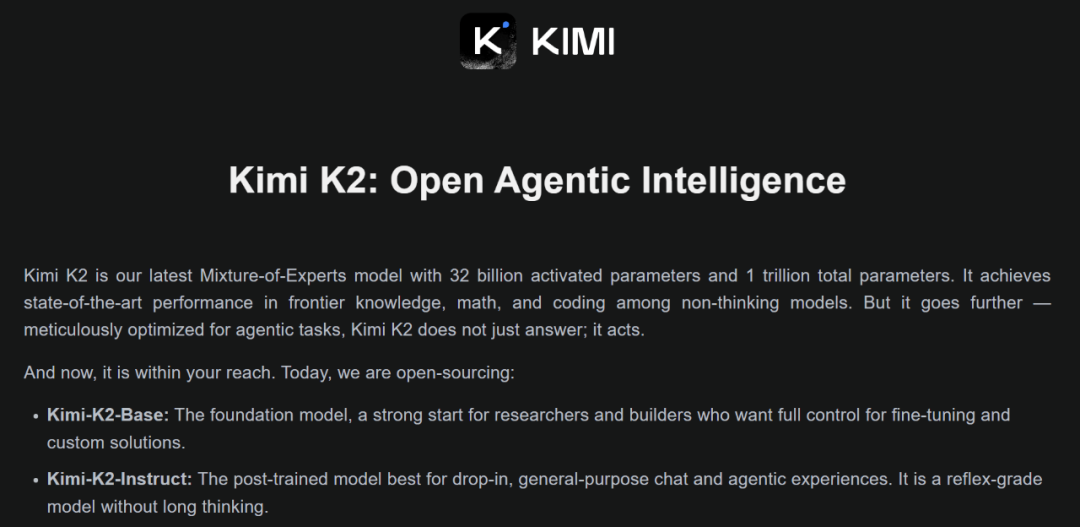Keywords:Kimi K2, Grok 4, H-Net, POLAR, Open-source large language models, Trillion-parameter large language models, Dynamic chunking technology, Policy discrimination learning, Code model performance comparison, Byte-level end-to-end learning, Reward model scaling bottleneck, Agent coding capability
🔥 Focus
Kimi K2: Open-Source Trillion-Parameter Large Language Model Released: Moonshot AI has released Kimi K2, a 1 trillion parameter (32 billion active parameters) open-source large language model (LLM). It achieved state-of-the-art (SOTA) results on several benchmarks, including LiveCode Bench, AIME2025, and GPQA-Diamond, surpassing open-source models like DeepSeek-V3 and Qwen3. K2 also outperforms closed-source models like GPT-4.1 and Claude 4 Opus on several performance metrics. Focusing on code and agent tasks, K2 boasts powerful tool-calling capabilities, automatically understanding task environments and deciding on action plans without detailed workflow instructions. Kimi K2’s release has injected new energy into the open-source community. Its strong performance and low API pricing make it a strong competitor to Claude 4 Sonnet, and it has been hailed as the “DeepSeek moment” for code models. (Source: 机器之心, HuggingFace, ClementDelangue )

Dynamic Chunking Revolutionizes Deep Learning Architecture: New research introduces H-Net, a hierarchical network architecture that replaces traditional tokenization with a dynamic chunking mechanism, learning directly from bytes and achieving true end-to-end deep learning. H-Net outperforms BPE-based Transformer language models with the same computational and data resources and demonstrates better data scaling in multi-level structures, even rivaling twice-as-large token-based Transformers. This technology excels in languages and modalities like Chinese, code, and DNA sequences, where tokenization is less critical, laying the foundation for multimodal, efficient next-generation AI capable of long-context reasoning and improved performance. (Source: HuggingFace Daily Papers, krandiash, tri_dao)
Musk Releases Grok 4, Claims it Crushes All Other Large Language Models: xAI has released Grok 4, which Musk calls “the world’s most powerful AI model.” Grok 4 achieved leading results on multiple benchmarks, including becoming the first model to exceed 50% accuracy on the “Human Level Examination” (HLE) and achieving a perfect score on AIME25. Grok 4 emphasizes the importance of incorporating tools in training and demonstrates its powerful capabilities in reasoning, multimodal understanding, programming, and drug discovery. Furthermore, Grok 4 will be used for Tesla’s voice assistant and Optimus humanoid robot, with programming models, multimodal agents, and video generation models planned for the future. (Source: 量子位, xai, jeremyphoward)
Shanghai AI Lab Proposes New POLAR Paradigm for Policy Discrimination Learning, Breaking Through Reward Model Scaling Bottleneck: Shanghai AI Lab has proposed POLAR (Policy Discrimination Learning), a new reward model training paradigm. By using contrastive learning to model the distance between policies and aligning human preferences with a small number of preference samples, POLAR addresses the scaling and generalization challenges of traditional reward models. POLAR performed exceptionally well in preference evaluation and reinforcement fine-tuning experiments, significantly surpassing SOTA reward models, especially in STEM tasks. POLAR’s scaling effect is expected to break through the last link in the reinforcement learning chain extension, bringing groundbreaking progress to large model post-training. (Source: 量子位, hrishioa, tamaybes)
🎯 Trends
Google Acquires Windsurf Team to Strengthen Gemini’s Agent Coding Capabilities: The Windsurf team has joined Google DeepMind and will focus on advancing Gemini’s research in agent coding and tool usage. This move means OpenAI’s acquisition plan for Windsurf has fallen through and highlights Google’s determination in the AI talent race. (Source: koraykv, shaneguML, zachtratar)
🧰 Tools
Kimi K2: A 1 trillion parameter open-source LLM specializing in code and agent tasks, with powerful tool-calling capabilities. (Source: Kimi_Moonshot, Reddit r/LocalLLaMA)
Comet: A powerful AI agent product that enhances internet browsing and automates tasks, such as posting items on Facebook Marketplace. (Source: AravSrinivas, denisyarats)
📚 Learning
LLM Reasoning Handbook: A free handbook covering all aspects of LLM reasoning. (Source: omarsar0)
Diffusion Models Tutorial: A paper explaining the mathematical principles of diffusion models step-by-step. (Source: oh_that_hat)
🌟 Community
Scaling and Capabilities of AI Models: Social media buzzes with the release of Kimi K2, discussing its scaling capabilities, comparisons with other models, and impact on the open-source community. Some consider K2 the “DeepSeek moment” for code models, while others question its real-world performance. (Source: ClementDelangue, Teknium1, natolambert)
Ethics and Applications of AI Video Generation Technology: Discussions revolve around the rapid development of AI video generation technology and its ethical implications and application prospects. Concerns about the misuse of AI-generated videos are raised, while others explore the potential of AI video in creative and commercial fields. (Source: multimodalart, mmitchell_ai, c_valenzuelab)
AI Agents and Agent Frameworks: Focus on the construction and application of AI agents, as well as the latest developments in agent frameworks like LangChain. Discussions cover how to build production-grade, scalable agents and how to address the challenges encountered in practical applications. (Source: LangChainAI, jerryjliu0, Hacubu)
AI Ethics and Social Impact: Discussions on the impact of AI technology on society, including AI ethics, AI regulation, and the impact of AI on employment. (Source: AndrewYNg, random_walker, dwarkesh_sp)
Claude Code Tools and MCP Usage: Discussions on the various tools of Claude Code and the use of MCP (Model Context Protocol), sharing experiences and recommendations. (Source: Reddit r/ClaudeAI)
💡 Other
AI’s Impact on Internet Content Quality: The proliferation of AI-generated content, such as videos and papers, has raised concerns about the decline in content quality. Some believe AI is turning the internet into a giant “garbage dump,” while others see AI as a tool to improve content creation efficiency. (Source: 36氪, Reddit r/artificial)
YouTube to Demonetize AI-Generated Content: YouTube will stop paying creators for AI-generated content to address the issue of AI content flooding. This move has sparked discussions about the business model and future development of AI content creation. (Source: Reddit r/artificial)
OpenAI Delays Open-Source Model Release: OpenAI has again delayed the release of its open-source model, stating that it needs more time for safety testing. This has led to speculation and discussion in the community, with some believing OpenAI is responding to pressure from competitors like Kimi K2. (Source: Reddit r/LocalLLaMA, sama)
